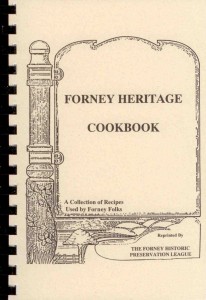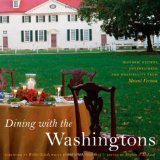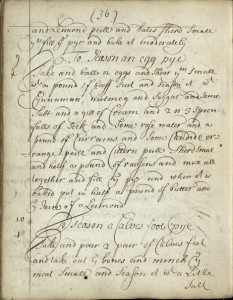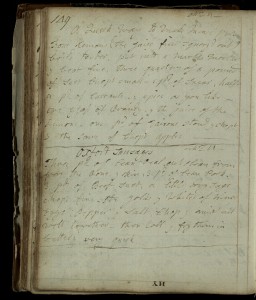In 1986, the Forney Heritage Society first published the Forney Heritage Cookbook, subtitled “A Collection of Recipes Used by Forney Folks”. It’s been reprinted a few times by the Forney Historic Preservation League, most recently in 2013. I’ve toyed with the idea of using these recipes as a fundraiser, not just by selling the books (available here!) but by having a bake sale or progressive dinner offering dishes from the cookbook. Not a bad idea. One potential drawback is this: the recipes in this book are solid but, for lack of a better word, normal.
Some of the recipes could have been passed down through the generations, but the cookbook itself is only 30 years old. Some recipes which might have been truly “made from scratch” at one time now include boxed biscuit mixes and other shortcuts. Many of the dishes are standard fare for southern cooks, with casseroles, cakes and pies, hot and cold appetizers, and some flair from south of the border.
Now, I don’t want to downplay the recipes in this cookbook. They’re good! I would make these dishes and want to eat them! As a cookbook, it’s great. (Please buy one!) Local families share their recipes, and you can recreate your favorite dishes from the pot-lucks and church suppers of your childhood. But they’re not weird enough to pique a lot of interest. Enter the world of Historical Cookery.
Historical cookery is a food movement which seeks to celebrate and preserve the recipes, methods, and farm-fresh ingredients of yore. Want to recreate a traditional medieval feast? You can do that. 17th century English dessert recipes more your thing? Find some here. Want to know what George and Martha Washington served for breakfast? Buy the book and make it yourself, from hoecakes and honey to distilled whiskey. How about a timeline covering the evolution of food preparation with recipes dating back to BC? Got you covered.
Part of the interest in historical cooking is developing a closer relationship with your food, something akin to the farm-to-table movement. Learn where your food comes from, how it’s raised or grown, and how to prepare it with minimal preservative or additives. But part of this resurgence is due to historical organizations looking for a way to make history interesting by centering learning on a topic people can relate to: food.
Colonial Williamsburg has a program called Historic Foodways which operates demonstration kitchens onsite and incorporates 18th century recipes into the menu at the local hotel and lodge. The website and blog offers a recipe index, videos, and of course cookbooks for sale. The recipes include the original 18th century version plus an updated edition for modern cooks.
“Cooking in the Archives” is a blog and food history project with funding from a University of Pennsylvania fellowship. As described on the website:
“Cooking in the Archives” sets out to find, cook, and discuss recipes from cookbooks produced between 1600 and 1800. This project is situated at the intersection between the practice of modern cooking and the history of early modern manuscript and printed recipe books. Penn’s Kislak Center for Special Collections, Rare Books and Manuscripts holds over 100 recipe books from the early modern era. We believe these recipes belong in the modern kitchen as well as the historical archive.
The fun part is that they cook the dishes and report on the results. Some are pretty straightforward (cookies) while others have interesting results (fish custard). The Special Collections of the University of St. Andrews also has a blog called “Echoes from the Vault” which showcases, among other items from its archives, historical cookbooks and recreations of their recipes, such as this mincemeat pie bake-off from last Christmas.
These recipes can get pretty complicated as some of the language from hundreds of years ago requires a little work and translation before even understanding exactly what ingredients you need and what to do with them. (Click the photos to see them better.) Others are impressive for their shear size – Martha Washington’s Great Cake has basic ingredients but in huge quantities: 40 eggs, 4 pounds of butter, 4 pounds of sugar, 5 pounds of flour, etc. Still more inspire awe just for the inconvenience of making them without whisks, beaters, slow cookers, or ovens with temperature settings.
The recipes in our Forney Heritage Cookbook might not be that exciting, but they sure sound good. And I can understand how to cook them.
Share your thoughts (and maybe some recipes) on our facebook page, and see below for links to the pages mentioned in this entry plus more.
Thanks,
Kendall
Links:
The “History is Served” blog from Colonial Williamsburg.
The Recipes Project also incorporates historical recipes into education.
http://recipes.hypotheses.org/
The Food Timeline is, in fact, a timeline related to food going back thousands of years. It also includes A LOT of info about how certain dishes came about and why.
Assorted recipes from Mount Vernon can be found here.
http://www.mountvernon.org/search/?q=recipes#gsc.tab=0&gsc.q=recipes&gsc.page=1
“Echoes from the Vault” from the Special Collections of St. Andrews discusses much more than food.
http://standrewsrarebooks.wordpress.com/
“Cooking from the Archives” – the adventures of historical cooking from U Penn.
http://rarecooking.wordpress.com/
Gode Cookery is your source for all of your medieval cooking needs. Includes recipes (with translations from Old and Middle English) and “Medieval Cooking for Beginners”, a handy guide for those looking to experiment with historical cookery without the obligation of documented historical sources.
“Feast of the Centuries” blog from a culinary historian includes lots of links and a handy breakdown of recipes by time period and cuisine.





